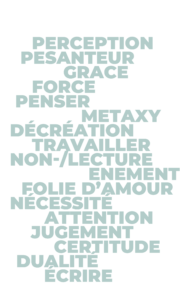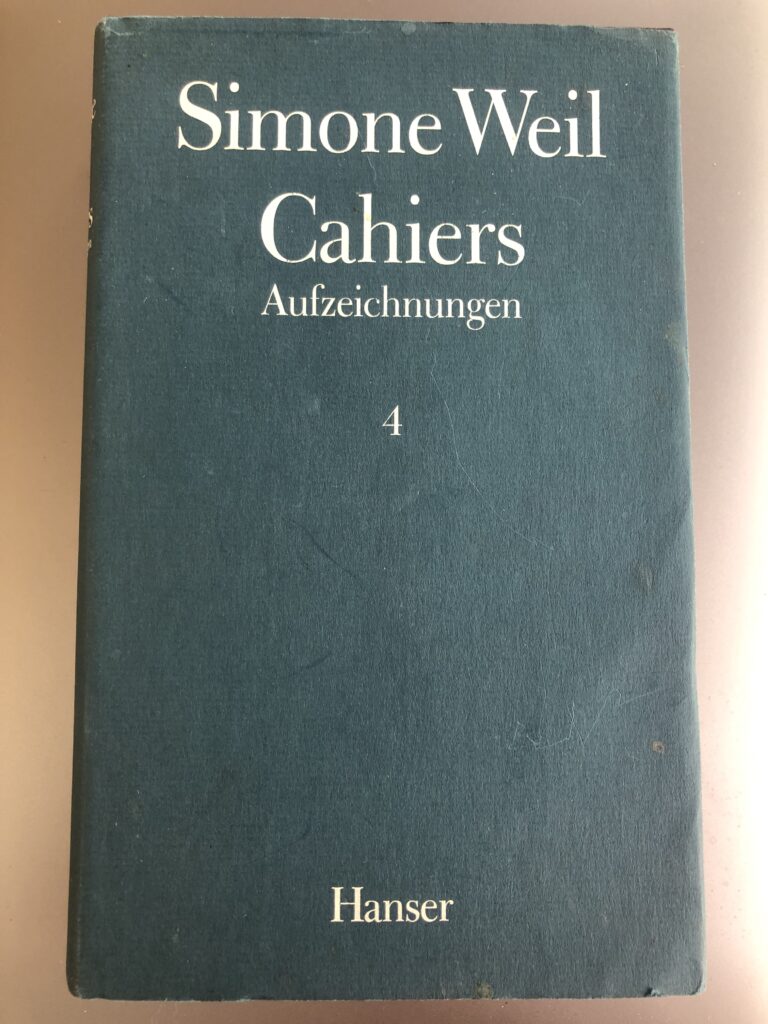
Marcus
is a German philosopher based in Berlin and was professor for Art and Theory at the Academy of Fine Arts in Karlsruhe. His speciality is working at the intersection of art and philosophy. He is a sought-after speaker and a prolific writer, continuously publishing his books and texts at Merve, Matthes & Seitz, and the MIT Press.

Leseschlüssel
RIGORISMUS
APORETISCHES GEBET
LEERE
REINHEIT
HUNGER
ZUKUNFT
STRANG
INFINITESIMALKALKÜL
TRAUM
OHNE GOTT
BLICK INS LEERE
EXISTENZDENKEN
Wenn es ein Wissen davon gibt, was Philosophie ist, dann kommt es aus der philosophischen Praxis. Philosophie ist Denken des Universellen (dessen, was alle angeht), für das die Denkenden mit ihrer Existenz einstehen. Sie ist mehr Existenzform als akademische Übung. Schließlich reißt das Denken den Denkenden mit sich mit. Immer steht mit seinen Fragen seine Existenz infrage. Daran ist nichts übertrieben, heroisch oder pathetisch. Es entspricht der einfachen Evidenz philosophischen Denkens, dass sie den Menschen in seiner Totalität ergreift, destabilisiert, erschüttert, aber auch leicht und fröhlich stimmen kann. Mit Spinoza weiß Deleuze und mit ihm Toni Negri, dass beatitudo zum Denken gehört: Fröhlichkeit, die zur Bejahung noch der größten Widrigkeiten animiert. Die Bereitschaft also, jenseits einfacher Gutheißung, Welt und Selbst trotz ihrer Schwierigkeit und Undurchsichtigkeit zu affirmieren. Mehdi Belhaj Kacem hat Recht, dasselbe von den Dichtern zu sagen.* Sie alle stehen mit ihrer Existenz für ihre Buchstaben ein, weshalb sie von der „Gesellschaft“ diskreditiert werden. Immer noch? Immer noch. Oder die Philosophen und Dichter neutralisieren sich zu Funktionären des Betriebs, der Singularität nicht ertragen kann. Bevor man – allzu vorhersehbar – von einem Klischee spricht, sollte man sich vergegenwärtigen, dass Baruch de Spinoza ein Verfolgter war, Kierkegaard ebenso, Nietzsche ein Gekreuzigter oder Wahnsinniger, Walter Benjamin ein Getriebener, Simone Weil eine sich zu Tode Hungernde, um nur fünf Beispiele zu nennen. Die Serie von Dichterinnen und Dichtern, die auf Kosten ihres Lebens dichteten, ist unendlich lang. Denken wir an Gérard de Nerval, Arthur Rimbaud, Antonin Artaud, Silvia Plath, …
* Mehdi Belhaj Kacem, Artaud und die Theorie des Komplotts, Berlin 2017.
RELIGIO
Bei Weil: der Appell zur Entwurzelung: „Man muss sich entwurzeln. […] Sich in der Verbannung zu Hause fühlen lernen. Verwurzelt sein in der Abwesenheit jeglicher Stätte.“* Wie immer bei Weil geht der Vektor gen nichts. Er zeigt in die Leere, für die Gott steht. Wenn es ein Subjekt ist, das sie zu denken gibt, dann ist es eines der Leere. Es bindet sich an nichts als an sie. Das meint die lateinische religio, diese Art von Bindung, dieses entleerende Bündnis mit der Leere = mit Gott.
*Simone Weil, Schwerkraft und Gnade, Berlin 2021, S. 46.
VORLETZTES WORT
Søren Kierkegaard, Simone Weil und Ludwig Wittgenstein verbindet, dass sie in Fühlung mit dem Abgrund sind. Alles entscheidet sich daran, den Kontakt zu ihm durch einen selbst abgründigen Glauben zu halten. Fühlung und Glaube verweisen auf das Jenseits des Begründbaren. Deshalb Abgrund: weil alles Begründbare über dem Abgrund des Unbegründbaren schwebt. Lew Schestow wiederum spricht von einer „Apotheose der Grundlosigkeit“. Die Erfahrung der Grundlosigkeit ist philosophische Erfahrung par excellence. Man kann sie Erfahrung des Unerfahrbaren nennen und doch findet sie statt. Allerdings im Modus der Unvollständigkeit. Bei Kierkegaard ist diese Unvollständigkeit als Sprung in den Glauben formalisiert. Bei Weil als Berührung der Leere, die Gott heißt. Bei Wittgenstein als Notwendigkeit, vor dem Abgrund innezuhalten: „Wo Andere weitergehen, dort bleibe ich stehen.“* Schestow spricht von der Verzweiflung als dem vorletzten Wort. Das letzte Wort entzieht sich, da es nicht (sinnvoll) gesprochen werden kann.
* Ludwig Wittgenstein, Über Gewißheit, Frankfurt a. M. 1970, S. 89.
TOPOLOGIE
Das Diesseits zum Jenseits machen, die Immanenz zur Transzendenz konvertieren, und umgekehrt = beide Ordnungen zu einer einzigen erklären, der man ohne sicheres Ortsbewusstsein angehört, ist Kafkas und Weils topologisches Problem: »Diese Welt ist die verschlossene Türe. Sie ist eine Schranke. Und zugleich ist sie der Durchgang.«
* Simone Weil, Schwerkraft und Gnade, Berlin 2020, S. 157.
WAHRHEITSRISIKO
Existenz und Wahrheit – könnte ein Buch heißen, das den Bogen von Nietzsche zu Foucault spannt, um festzustellen, dass jede ernst zu nehmende Philosophie den Widerstreit zwischen diesen Begriffen austrägt. Austrägt, im Sinne Heideggers, also im Sinne von Aufsichnehmen, bis an die Grenze des Selbstverlusts. Dafür steht bereits der Sokrates der Apologie: für die Bereitschaft, für sein Denken mit dem Mut zum Nonkonformismus einzustehen. Nicht jeder, der sich für einen Nonkonformisten hält, ist einer. Es ist ohnehin kaum jemand einer. Und dennoch ist der bereits im Denken Platos samt seiner Insistenz auf der Infragestellung der Doxa, d.h. der zirkulierenden Meinung angelegte Nonkonformismus Index echter Philosophie. Echt nicht als dogmatischer Authentizismus, sondern als immer neu anhebende Selbstverunsicherungsdynamik für die der Denkende als erster bezahlt. Man muss bezahlen können im Denken und fürs Denken. Wer glaubt, es sei nicht so, hat kaum zu Denken begonnen. Wie erklären sich Nietzsches Invektiven anders, als durch dessen Wissen mit ihnen gegen seine Zeit aufzustehen. Sloterdijk hat von Nietzsches „Bereitschaft zum existentiellen Wahrheitsrisiko“* gesprochen. Seine Existenz belegt, wie sehr Sloterdijk damit recht hat. Natürlich ist hier der Pathosvorwurf nicht weit. Er erscheint fast geboten. Immer erfolgt er seitens derer, die im Denken nichts riskieren. Sokrates hat für sein Denken mit dem Leben bezahlt, Spinoza wurde mit einem Bannfluch versehen und aus der Synagoge gejagt, Simone Weil floh ihre Zeit in den Hungertod und Nietzsche hat als unzeitgemäßer Denker den Verstand verloren.
* Peter Sloterdijk, „Philologie der Existenz, Dramaturgie der Kräfte“, in: Friedrich Nietzsche, Die Geburt der Tragödie aus dem Geist der Musik, Nachwort, Frankfurt a. M. 1987, S. 191.
VICE VERSA
Im Intimen das Extime auszumachen ist, was Lacan Psychoanalyse nennt. Das Draußen ist drinnen, weshalb keine Innerlichkeit je zur Ruhe kommt. Sollte also die Ruhelosigkeit – das augustinische Herz oder dasjenige Rousseaus oder Hegels, Kierkegaards und Nietzsches, Simone Weils und vieler anderer – den Panikzustand des Subjekts indizieren, das angesichts des Inkommensurablen, von dem es primordial durchschossen ist, sein Außersichsein erfährt? Die Dichotomien sind unbrauchbar geworden für ein Denken, das sich weder Transzendenzglauben noch Immanenzvertrauen gewährt. Diesseits und Jenseits, Innen und Außen, Endlichkeit und Unendlichkeit konstituieren, statt ein binäres Register, die Unentscheidbarkeit seiner beiden Seiten. Das hat Derrida auch ohne Spinoza gewusst. Da läuft etwas zusammen, oder besser: Der Mix war immer schon da. Lacan betreffend heißt das: Die Unterscheidung zwischen Realität und Realem wird nicht weniger notwendig dadurch, dass sie, einmal getroffen, zwangsläufig kollabiert. Sie bleibt nur im Horizont des analytischen Verstandes plausibel. Kommt die Vernunft, das heißt das Begehren, ins Spiel, erweist sie ihre Unhaltbarkeit. Schließlich muss das Denken – nachdem es der Differenz von natura naturata und natura naturans oder Diesseits und Jenseits oder Bewusstsein und Unbewusstem etc. beigepflichtet hat –, nicht nur die Kompossibilität, sondern die Identität von Realität und Realem einsehen. Denn das Reale ist die Realität und vice versa.
SUCHERISCH
ANOREKTISCH
ZURÜCK ZU SIMONE WEIL
New contributions:
Rachel Pafe (Berlin): The Miracle of Love Amidst the Crushes of War: Thinking through The Iliad with Susan Taubes and Simone Weil
Rachel Pafe is a writer and researcher interested in modern Jewish thought and critical theories of mourning. She is currently doing a joint PhD at Goethe University of Frankfurt and Université Lille. For more information visit Rachel’s Page. To read the German-version of the article, please click here. In her 1956 dissertation on French philosopher-mystic Simone
Marcus Steinweg (Berlin): “Notizen zu Simone Weil”
Leseschlüssel Die hier gelisteten – teils veröffentlichten, teils unveröffentlichten – Notizen von Marcus Steinweg beziehen sich allesamt auf Simone Weil. Die Liste ist offen und wird schrittweise durch neue Notizen erweitert. RIGORISMUS An Simone Weil besticht ihr Rigorismus und ihre Klarheit. Noch wenn sie sich dem Alltäglichen zuwendet, geht der Vektor ins Nichts. Nie versenkt
Elisabeth Hubmann (Genève): Organ improvisations in response to Simone Weil’s “Les Lutins du feu” (ca. 1921/22)
Il dansait, il dansait toujours, le peuple des âmes candides, des âmes des enfants qui ne sont pas encore nés; attendant leur tour d’être des hommes, les lutins se poursuivaient sur les bûches crépitantes. Simone Weil, Les Lutins du feu, 1921/22. ELISABETH HUBMANN Abstract Elisabeth is an organist, musicologist, and environmentalist active in Genève, Amsterdam
Wolfram Eilenberger (Berlin) und Martina Bengert (denʞkollektiv): Eine Denkerin der radikalen Hoffnung
Overview Am 31. Januar 2021 diskutierten Martina Bengert und Wolfram Eilenberger in dem von Simone Miller moderierten Podcast “Philosophin Simone Weil. Eine Denkerin der radikalen Hoffnung” der Reihe Sein & Streit des Deutschlandfunk Kultur über die Aktualität Weils für unsere heutige Zeit. On the 31 January 2021, Simone Miller welcomed Martina Bengert und Wolfram Eilenberger
Chris Kraus (Los Angeles): Simone Weil. Two Days in February
THE PAPIER collé AS PART OF THE »PAPIER collé SIMONE WEIL« WE INVITED WRITERS AND ARTISTS TO SHARE THEIR IDEAS ON SIMONE WEIL. SOME BITS AND PIECES, SOME MATERIAL, THOUGHTS… TRACES AND LINES THAT REVOLVE AROUND THEIR READING OR RESEARCH. LIKE A SUNDAY STROLL THROUGH AN IMMATERIAL-IMAGINATIVE LIBRARY. LIKE A BORGES READING MACHINE THAT UNENDINGLY
Mark von Schlegell: Simone Azul
THE PAPIER collé AS PART OF THE »PAPIER collé SIMONE WEIL« WE INVITED WRITERS AND ARTISTS TO SHARE THEIR IDEAS ON SIMONE WEIL. SOME BITS AND PIECES, SOME MATERIAL, THOUGHTS… TRACES AND LINES THAT REVOLVE AROUND THEIR READING OR RESEARCH. LIKE A SUNDAY STROLL THROUGH AN IMMATERIAL-IMAGINATIVE LIBRARY. LIKE A BORGES READING MACHINE THAT UNENDINGLY